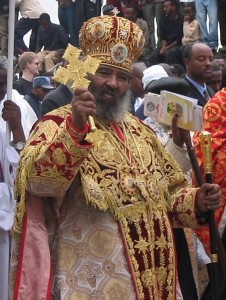The head of the Ethiopian Orthodox Church, Patriarch Abune Paulos, has died aged 76. Abune Paulos, spent the last two decades as the sole figurehead of the popular Ethiopian Orthodox Church leading 40 million Ethiopians (half the country's population.) His death has sparked a debate on religion and politics and re-triggered speculation about the whereabouts of Prime Minster Meles Zenawi.
Writing about Abuna Paulos in a Facebook post Abiye Teklemariam noted:
In the last two decades, Meles Zenawi and Abuna Paulos had probably been the two most powerful men in Ethiopia. Did I just say “had”? The patriarch is dead. Meles Zenawi, despite the protestation of the hacks, is either incapacitated or dead. What a time!

Patriach Abuna Paulos at the Ethiopian Orthodoxy Epiphany (Timket) Celebration January 2005. Photo released into the public domain by Wikipedia user Jhaustein.
The news of the death of Abuna Paulos, who was a strong supporter of Meles Zenawi, has drawn feelings of uneasiness many Ethiopians have about the whereabouts of Meles Zenawi. The situation in which the government is operating has been explained by Birrkan Fanta who posted [amh]:
“ከአቡነ ጳውሎስ ጋር በተያያዘ ከቅርቡ የሙስሊም ወንድሞቻችን ተነስተን በቀጣይነት ሊከሰት የሚችለውን ነገር መገመት የምንችል ይመስለኛል … የመንግስት የቤት ስራ በዝቶዋል .. በእንቅርት ላይ ጆሮ ደግፍ አንደሚሉት …መቼም ሽፈራው ጃርሶ ቀጣዮን አዲስ ፓትሪያርክ ለመምረጥ ለማስመረጥ ደጋሚ መጋረጃዉን የሚከፍቱ አይመስለኝም … አባይ ፀሃዬ እንደበፊቱ በቀላሉ የሚወጡትም ጉዳይ አይመስለኝም ያውም ማስተር ማይንድ እምጥ ይግባ ስምጥ ሳይታወቅ …አይይይ አይመስለኝም … ግን ሁላችንም አንድ ነገር ተምረናል …በቃ ድምፃችን ይሰማ ማለትን !”
Mesfin Negash shared his reflection on Facebook about the relationship between church and state in Ethiopia:
Patriarch Paulos of the Ethiopian Orthodox Church is dead. With it one of the principle supporter of the Ethiopian dictatorship is gone for good. Not only his appointment was a pure political manipulation but his years as the head of the Church was scandalous, humiliating, controversial and corrupt in all senses of the term. The Church is once again on a historical crossroad. If the church miss(es) this chance to bring a less political and more pro-church leader, the internal crisis may never stop in decades. We will certainly witness another drama in the (s)election of the next Patriarch. I can imagine what is going inside the church now. Some may regret that Aba Paulos can see neither his own nor his protectorate MZ's funeral procession as he used to enjoy being the focus of attention for every reason under the sun. Now you may RIP.
Daniel Kibret, blogging from Addis Ababa, pointed [amh] out four areas the church should be concerned with:
በዚህ ጊዜ ውስጥ አራት ነገሮች እንዳይፈጠሩ ጥንቃቄ ያስፈልጋል
1. የእርሳቸው ደጋፊና ተቃዋሚ በሆኑ አካላት መካከል በሚፈጠር ግጭት ቤተ ክርስቲያኒቱ እንዳትታወክ
2. ሀብት እና ቅርስን የማሸሽ አዝማሚያ እንዳይከሰት
3. ቤተ ክርስቲያኒቱን ማን ለጊዜው ይምራት በሚለው ዙርያ በሚፈጠረው ልዩነት አደጋ እንዳይከሰት
4. በቀጣይስ ማን በወንበሩ መቀመጥ አለበት በሚለው ዙርያ ችግር እንዳይከሰትአሁን የመረጋጊያ ጊዜ ነው፡፡ ቅዱስ ሲኖዶስ ምንም ዓይነት ውሳኔ ከመስጠቱ በፊት ለፓትርያርኩ የኀዘን ጊዜ ያውጅ፡፡ ጊዜያዊ ኮሚቴ ያቋቁም፡፡ ነገሮችን በግልጽነት ለሕዝቡ ይፋ ያድርግ፡፡
2. There should be no tendency of prowling of assets and heritages. They should be conserved
3. The issue selecting an interim leader of the church should not unwrap sudden dangers
4. The issue of who should be the new pop should not be a point of divergenceThis time must be a time for serenity. The Supreme Council should announce an official mourning period before taking any decision. An ad-hoc committee should be established. The public should be notified on regular basis.
It seems religion and state are deeply intertwined in Ethiopian politics. Recently Ethiopian Muslims have also been protesting against state intrusion into their religious affairs.







3 comments
This is a cult religion, which should not be allowed to thrive in the western world. Its hard stance to promoting the stoning gays, discrimination on women’s right, etc. makes it an abominable religion to any civilized society. We should bring awareness to US citizens and the western world that there is a whole new group of sharia law sympathizers brewing right under their noses with the so called Ethiopian Orthodox cults.
The most artisitc and passionate Singer that i consider to
actually be a revolutionist, Teddy Afro. His Passion and deep love for history
shows in his work. God bless you Teddy Afro Teddy Afro. And Tikur Sew
AlbumTikur
Sew is a body of work, for those who listened to every track.
My favorite is the one you shared above. Teddy
Afro Tikur Sew
http://www.youtube.com/user/OfficialTeddyAfro
http://www.youtube.com/watch?v=aN7Z50Db5co
http://www.youtube.com/watch?v=xDFywpUP32U
http://www.youtube.com/watch?v=yV4H3XCqVoA
http://www.youtube.com/watch?v=1JPZov10RbA
http://www.youtube.com/watch?v=Rgb64glpcSY
http://www.youtube.com/watch?v=A-2Xjawio8k
http://www.youtube.com/watch?v=-e90nmPQDLs
http://www.youtube.com/watch?v=K4K3ljc0ie0
http://www.youtube.com/watch?v=hIH2V6z2Nbw
http://www.youtube.com/watch?v=Obdw6Dkeibc
http://www.youtube.com/watch?v=GGBpAyTCIz4